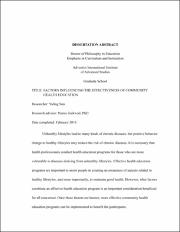Factors influencing the effectiveness of community health education
Abstract
Unhealthy lifestyles lead to many kinds of chronic diseases, but positive behavior change to healthy lifestyles may reduce the risk of chronic diseases. It is necessary that health professionals conduct health education programs for those who are more vulnerable to diseases deriving from unhealthy lifestyles. Effective health education programs are important to assist people in creating an awareness of aspects related to healthy lifestyles, and more importantly, to maintain good health. However, what factors constitute an effective health education program is an important consideration beneficial for all concerned. Once these factors are known, more effective community health education programs can be implemented to benefit the participants.
The primary purpose of this study was to identify the factors influencing the effectiveness of community health education as perceived by the participants of health education programs. After the review of literature, several important factors were identified, not all in the same studies. The factors that came out predominantly were social support, age, social economic status, culture, skilled health educators, educational strategies, communication skills, and a well-planned program. This study combined all these factors and attempted to find the most important factors for the effectiveness of community health education from the perspective of the participants of the programs.
A quantitative methodology in the form of correlational approach was utilized for the study. Data was collected from a total of 206 respondents who had attended community health education programs in 7 communities in the region of Cavite, Philippines. Multiple Regression, t-Test, and One-Way Analysis of Variance were used to analyze the data. As a result of this study, a predictive model was developed and presents 54.8% of variance in the factors influencing the effectiveness of community health education. Educational strategies, skilled health educators, age (50 years old & above vs. 10 to 29 years old), and religion (Adventist vs. Christian and Adventist vs. others) were significant predictors of the effectiveness of community health education.
Collections
Related items
Showing items related by title, author, creator and subject.
-
Factors affecting employee innovative behavior in for-profit health care organizations
Pilli, Sachin Noble (Adventist International Institute of Advanced Studies, 2012-03)This study identifies factors that predict employee innovative behavior in forprofit health care organizations in a developing country (Philippines). It also provides suggestions for enhancing innovative behavior for-profit ... -
Relationship between dental caries, eating habits, oral health behaviour, and body mass index among Filipino school-age children
Yapi, Linda-Luiselle B. (Adventist International Institute of Advanced Studies, 2019-02)The global increase of dental caries among school-age children has become a significant concern in the public health field worldwide. This phenomenon is also present in the Philippines at a high prevalence. This problem ...


